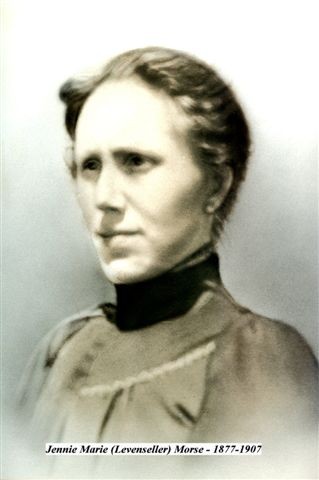A Mother’s Life cut Short
Jennie stood on the front porch, looking
across the lower field at the twin
mountains in the distance. Sometimes the
mountains were a comfort to her, as they
were named for her ancestors. Her parents
lived at the base of one of the mountains
on the further side.
“Amon! Amon! Where are
you?” called Jennie, receiving no answer.
That two-year old would be the death of
her yet. She thought that he was napping,
but he was nowhere to be found. Little
Lester was sleeping peaceably.
Jennie’s feet were wet
from searching in the back field. The rain
was lightly falling as she called out,
“Bertha, would you go to Ada’s and see if
Amon is there?” Ada was John’s youngest
sister, living next door. Ada and Jennie
had become great friends.
Bertha returned, carrying
a drowsy Amon in her arms. “Where did you
find him:” Jennie asked. “Asleep in Uncle
Ed’s calf stall with his arm around the
newborn calf,” replied Bertha.
Today was Jennie’s
thirtieth birthday. She was heavy with her
eighth child since her marriage to John
Morse twelve years before. She felt so
tired these days. Worrying and searching
for little Amon had made her feel
completely wrung out. It would be so nice
to just take a nap. Gram Susan was off
doing what she did best, attending to the
needs of a neighbor down the road. John
had taken a load of lime casks to Rockland
and would be gone most of the day. He’d
kept so busy, trying to earn some extra
money, especially with a new baby coming.
Jennie thought about how much had happened
in her thirty years of life.
She had been born on the
other side of the mountain, in
Lincolnville, Maine, at the base of
Levenseller mountain, beside the pond, all
of which bore the family name.
Jennie’s youth had been
carefree, the youngest daughter of Frank and Cynthia
Levenseller. Her oldest brother,
John lived over in Searsmont. He had
married Julia Berry just last year. Addie,
who was four years old than Jennie,
had married Howard Elms, called
’Hud’. Ed, her brother who was two years
older than she, was working in Boston,
Massachusetts. Papa would take him to
Rockland in the buggy, where he would
catch the Steamer for the remainder of the
trip to Boston. Ed had recently visited
her, bringing Mamma, when he was home.
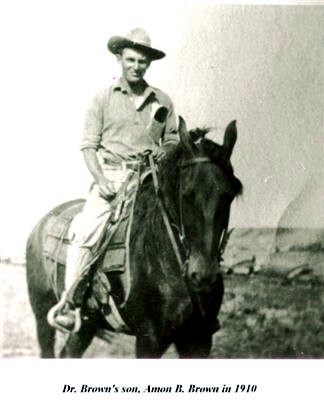 The Lermonds, her childhood
friends, lived nearby as she grew up. What
fun they’d had together! George was her
age, with Richard being two years younger.
Katie and Maud were closer to Addie’s age,
but they had all played together,
confiding their girlish secrets to each
other as young girls do. The Lermond boys,
Fred, Richard, Bernard and Frankie were
all handsome boys. They and Ed were great
pals. Then there was Dr. Brown’s dapper
good-looking son, Amon Brown. He was
always in the neighborhood visiting the
Lermond boys or Ed.
The Lermonds, her childhood
friends, lived nearby as she grew up. What
fun they’d had together! George was her
age, with Richard being two years younger.
Katie and Maud were closer to Addie’s age,
but they had all played together,
confiding their girlish secrets to each
other as young girls do. The Lermond boys,
Fred, Richard, Bernard and Frankie were
all handsome boys. They and Ed were great
pals. Then there was Dr. Brown’s dapper
good-looking son, Amon Brown. He was
always in the neighborhood visiting the
Lermond boys or Ed.
Jennie remembered the
night in 1893, before she had married
John, that Katie and George Lermond, Lula
Thomas, Helen Leadbetter, Jim Lamb, Ralph
Heal, Ed, Addie and Jennie went on a
sleigh ride to Northport to visit their
friend Alice Knight. Alice gave them a
very enjoyable evening, serving them tea
and some little cakes that she had made.
The moonlit evening was crisp and cold as
they returned home in the sleigh pulled by
Papa’s best horse. The sound of the sleigh
runners in the crisp snow and the ringing
sleigh bells still echoed in her ears.
All of the young friends
had great fun sliding on bobsleds behinds
Papa’s barn, or skating on the Pond across
from their house in the winter. Oh, it was
such a carefree time, swimming, picnics,
and playing with all of their friends in
the summer, skating, sliding and playing
cards in the winter evenings, visiting
back and forth with the Lermonds.
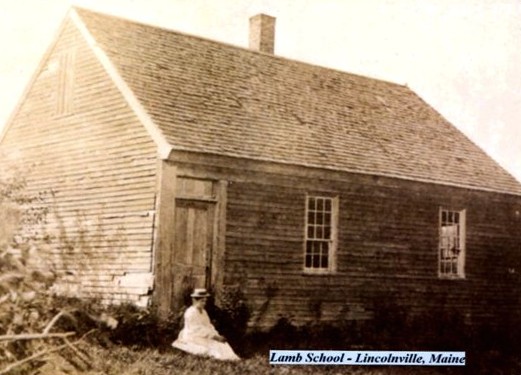 Jennie,
Ed and Addie attended the one-room Lamb
School down the road. Papa was the school
Superintendent for the Town of
Lincolnville. He served as Selectman, and
was a teacher for over fifty years. He was
a strict teacher, not only with his own
children, but with all of the students.
When her father taught a lesson, you
learned it. Learning came easy to Jennie.
She was so much like her father, who was
of German descent, from the early settlers
who came to Old Broad Bay, now called
Waldoboro, from the old country in the
1700’s.
Jennie,
Ed and Addie attended the one-room Lamb
School down the road. Papa was the school
Superintendent for the Town of
Lincolnville. He served as Selectman, and
was a teacher for over fifty years. He was
a strict teacher, not only with his own
children, but with all of the students.
When her father taught a lesson, you
learned it. Learning came easy to Jennie.
She was so much like her father, who was
of German descent, from the early settlers
who came to Old Broad Bay, now called
Waldoboro, from the old country in the
1700’s.
In 1893, Jennie stayed
with her brother, John, in Searsmont, and
attended high school there. She was
teaching in the Lincolnville schools when
she was sixteen years old.
Jennie sat down on the
porch steps to rest. She was seven months
pregnant, but she felt pains come and go.
This had gone on for several days. She
looked across the at the mountains. For a
fleeting moment she wished that she could
be at home by the Pond with Papa and
Mamma, and sleep for a whole afternoon in
the big feather bed.
Jennie recalled one
summer afternoon, when she was sixteen,
she and her friends were by the Pond. A
rack of lime casks, driven by a tall dark
handsome young man came over the road. As
the wagon pulled along beside the young
girls, he stopped and chatted before going
on to Rockland.
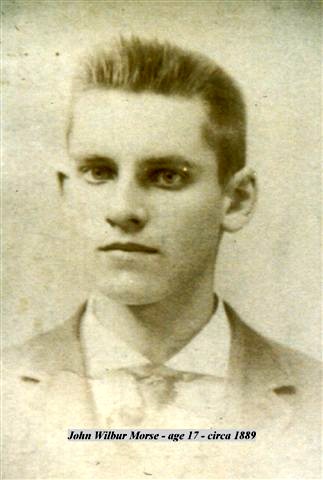
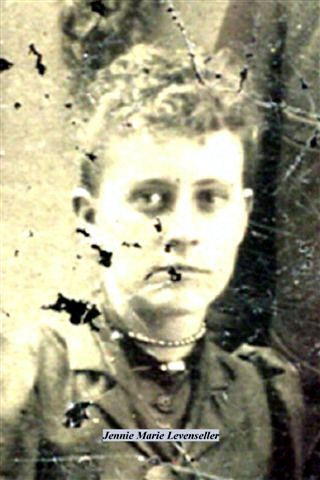 The next week the same
young man drove by. Jennie had seen him go
by before, when she and her friends were
swimming. She began to watch for the
twenty-two year, whose name she had
learned was John W. Morse from Belmont.
One day John asked her if she would like
to ride to Rockland with him. Papa had
been very strict with his children. She
didn’t think that he would allow it. She
told Papa about John. He said that he knew
John’s mother, and that she was very well
thought of in the area.
The next week the same
young man drove by. Jennie had seen him go
by before, when she and her friends were
swimming. She began to watch for the
twenty-two year, whose name she had
learned was John W. Morse from Belmont.
One day John asked her if she would like
to ride to Rockland with him. Papa had
been very strict with his children. She
didn’t think that he would allow it. She
told Papa about John. He said that he knew
John’s mother, and that she was very well
thought of in the area.
John was driving by more
often that summer. Just to hear the sound
of his horse coming over the road made
Jennie’s heart beat faster. She confided
to her friend, Maud Lermond, that she and
John were in love.
Then came the day she
told John that they needed to get married.
John came by to talk with Papa, to ask for
Jennie’s hand in marriage. Jennie had
confided to her sister, Addie, that she
was ‘in a family way’. Addie had told
Mamma, who in turn told Papa. Jennie was
seventeen years old.
Papa paced back and forth
across the room, with his hands behind his
back, twiddling his thumbs. He then spoke
to John. “Son, do you realize the
responsibility that you are taking on?”
John answered, “Yes sir, I do. I love
Jennie and would like to make her my
wife.” Papa told John that he had better
take very good care of his youngest child.
Their wedding was very
inconsequential. John took her to the home
of George W. Morse, Justice of the Peace,
in Belmont on Valentine’s Day, 1895. He
then took her to his parents’ home in
Belmont. Six and a half months later,
Susie was born.
After Susie's birth,
Jennie again taught school in Lincolnville
for a short time, but one year later,
Bertha was born. She again taught school,
as she and John needed the extra money.
Two years later, Hazel was born, followed
by Clarence, John Everett, Amon and
Lester. Now she was expecting another
child.
John’s mother’s home was
always a busy household. John had two
older brothers, Fred and Frank, with an
older sister, Etta. Ada, who lived next
door, was the youngest. Fred’s wife,
Cordelia, died in Massachusetts in 1887,
leaving four small children. Gram Susan
had gone to Massachusetts on the Belfast
Steamer and brought the children back to
live on the farm. Charlie was eight years
old when Jennie had married John; Fred Jr.
was eleven, Gertrude was fourteen, and
Maud a year or so older. Then along came
John and Jennie’s growing family, adding
to an already crowded household.
Fred Jr. had married three years
ago, Gert married six years ago, and Maud
had married a young Frenchman by the name
of Boyea, moving to Canada. Charlie still
lived at home, along with Jennie’s family.
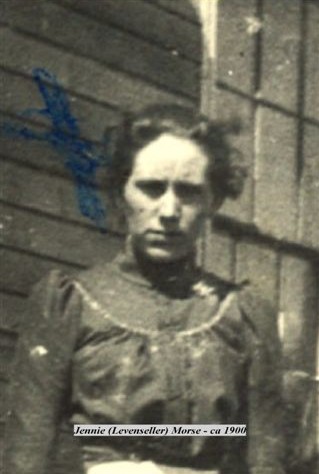 Most of the
time the house was full of activity. Gram
was in charge of the house, but Jennie
worked hard, tending her own growing
family, helping with the meals, canning
and preserving vegetables in the summer.
She would carry water in from the well, to
do the family laundry, including many,
many diapers. It seemed that there was
always something to do, with nary a moment
to really rest. Gram Susan was known as a
very able and capable nurse, tending to
the sick, delivering babies, and sometimes
called out to ‘lay out’ the dead,
preparing them for burial. She and Dr.
Tapley also did home operations, such as
removing tonsils, sometimes on a kitchen
table.
Most of the
time the house was full of activity. Gram
was in charge of the house, but Jennie
worked hard, tending her own growing
family, helping with the meals, canning
and preserving vegetables in the summer.
She would carry water in from the well, to
do the family laundry, including many,
many diapers. It seemed that there was
always something to do, with nary a moment
to really rest. Gram Susan was known as a
very able and capable nurse, tending to
the sick, delivering babies, and sometimes
called out to ‘lay out’ the dead,
preparing them for burial. She and Dr.
Tapley also did home operations, such as
removing tonsils, sometimes on a kitchen
table.
John’s father’s name was
Moses. He was a nice old man, and a hard
worker. Jennie remembered well the day
that he came home from building a stone
wall at the Chenery farm down on the Back
Belmont Road. A lot of people, about sixty
local men and women worked on the farm for
Mr. Chenery. John also worked for him at
times. Though Moses was elderly, Mr.
Chenery appreciated his expertise in many
skills, such as stone and mason
work. Moses had walked home for
dinner. He sat down at the kitchen
table, saying that he was tired. A few
minutes later his head dropped down onto
his chest. The children called for Gram to
come. Old Father Moses had died
at the dinner table. They buried him in
the East Searsmont cemetery.
Oh, my. Jennie winced in
pain. There shouldn’t be any pains this
early. It had been a month since the day
that she couldn’t find Amon. Today the
pain was more consistent, and she’d been
spotting blood for several days. My, how
her back ached. If she could only lie
down. She called the girls, Susie, Bertha
and Hazel, who were now eleven, ten and
eight years old. They were so much help
with the younger children. Clarence was
six, Everett, four and a half, Amon two,
and baby Lester would be a year old
tomorrow.
Oh! The pain came again
with a gush of bleeding. Jennie didn’t
recall a lot after that, except for the
pain of childbirth. John came home. Gram
was worried. She’d only seen a delivery
like this once before and it hadn’t ended
well. Gram told John that he’d better send
Charlie for Jennie’s mother, because
things were not going well. Jennie was
bleeding profusely and there didn’t seem
to be any way of stopping the bleeding. It
was a very hard delivery, but the tiny
baby boy was born late in the afternoon.
He was two months premature. Gram felt
that if the delivery could have waited a
month, or even two weeks, the infant would
have been stronger.
Jennie was very weak from
the loss of blood, but she could hear the
voices around her. Did she hear Mamma? Oh,
Mamma, I need to feel your hand on my
brow. And John. “I love you, John!” John
was crying. He really did love her, even
though he had worked away so much lately,
that she didn’t see much of him during the
days. Jennie slipped in and out of
consciousness, growing weaker for two
days.
Gram was packing Jennie’s
body with towels, dipping small ones with
cool water from the well. Gram held
Jennie’s hand as tears streamed down her
face. Old, hard-working Gram with the
wrinkled face and calloused hands. Jennie
had come to love the old lady, and Gram
loved Jennie dearly. “Mamma, where is
Papa?”, asked Jennie. Papa came to her
side, and for the first time in his life,
bent down and kissed his baby daughter’s
brow. The children were brought in. The
young ones were lifted up to kiss their
mother. Jennie heard her baby’s weak cry.
Ada was there. “Oh, Ada, watch over my
babies.” John’s sister, Etta, from over
the road in Searsmont was there also.
Jennie hadn’t chosen
a name for her tiny infant yet. His crying
seemed so far away. Jennie slipped
peacefully away, as the angels came to
bear her away to the waiting arms of
Jesus. She was beyond pain, and so rested
now. The grieving, loving family left
behind had a motherless infant, and seven
more children to tend to. The date was
July 7, 1907. Jennie was thirty years, one
month and five days old. Jennie was buried
in the family burial plot in the Marriner
Yard in East Searsmont with Grampa Moses
Morse.
The tiny infant clung to
life for two more days. He died on the day
of his mother’s burial. The family
disinterred Jennie’s home-made coffin,
burying her infant son in her arms, to be
together for eternity.
The family back at the
farm was grieving. Gram once again had a
family of small children who were her
responsibility. Gram coped, with the older
girls helping out. Life, though sometimes
very hard, goes on.

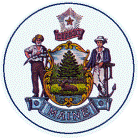
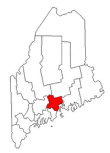
 The Lermonds, her childhood
friends, lived nearby as she grew up. What
fun they’d had together! George was her
age, with Richard being two years younger.
Katie and Maud were closer to Addie’s age,
but they had all played together,
confiding their girlish secrets to each
other as young girls do. The Lermond boys,
Fred, Richard, Bernard and Frankie were
all handsome boys. They and Ed were great
pals. Then there was Dr. Brown’s dapper
good-looking son, Amon Brown. He was
always in the neighborhood visiting the
Lermond boys or Ed.
The Lermonds, her childhood
friends, lived nearby as she grew up. What
fun they’d had together! George was her
age, with Richard being two years younger.
Katie and Maud were closer to Addie’s age,
but they had all played together,
confiding their girlish secrets to each
other as young girls do. The Lermond boys,
Fred, Richard, Bernard and Frankie were
all handsome boys. They and Ed were great
pals. Then there was Dr. Brown’s dapper
good-looking son, Amon Brown. He was
always in the neighborhood visiting the
Lermond boys or Ed. Jennie,
Ed and Addie attended the one-room Lamb
School down the road. Papa was the school
Superintendent for the Town of
Lincolnville. He served as Selectman, and
was a teacher for over fifty years. He was
a strict teacher, not only with his own
children, but with all of the students.
When her father taught a lesson, you
learned it. Learning came easy to Jennie.
She was so much like her father, who was
of German descent, from the early settlers
who came to Old Broad Bay, now called
Waldoboro, from the old country in the
1700’s.
Jennie,
Ed and Addie attended the one-room Lamb
School down the road. Papa was the school
Superintendent for the Town of
Lincolnville. He served as Selectman, and
was a teacher for over fifty years. He was
a strict teacher, not only with his own
children, but with all of the students.
When her father taught a lesson, you
learned it. Learning came easy to Jennie.
She was so much like her father, who was
of German descent, from the early settlers
who came to Old Broad Bay, now called
Waldoboro, from the old country in the
1700’s.
 The next week the same
young man drove by. Jennie had seen him go
by before, when she and her friends were
swimming. She began to watch for the
twenty-two year, whose name she had
learned was John W. Morse from Belmont.
One day John asked her if she would like
to ride to Rockland with him. Papa had
been very strict with his children. She
didn’t think that he would allow it. She
told Papa about John. He said that he knew
John’s mother, and that she was very well
thought of in the area.
The next week the same
young man drove by. Jennie had seen him go
by before, when she and her friends were
swimming. She began to watch for the
twenty-two year, whose name she had
learned was John W. Morse from Belmont.
One day John asked her if she would like
to ride to Rockland with him. Papa had
been very strict with his children. She
didn’t think that he would allow it. She
told Papa about John. He said that he knew
John’s mother, and that she was very well
thought of in the area.  Most of the
time the house was full of activity. Gram
was in charge of the house, but Jennie
worked hard, tending her own growing
family, helping with the meals, canning
and preserving vegetables in the summer.
She would carry water in from the well, to
do the family laundry, including many,
many diapers. It seemed that there was
always something to do, with nary a moment
to really rest. Gram Susan was known as a
very able and capable nurse, tending to
the sick, delivering babies, and sometimes
called out to ‘lay out’ the dead,
preparing them for burial. She and Dr.
Tapley also did home operations, such as
removing tonsils, sometimes on a kitchen
table.
Most of the
time the house was full of activity. Gram
was in charge of the house, but Jennie
worked hard, tending her own growing
family, helping with the meals, canning
and preserving vegetables in the summer.
She would carry water in from the well, to
do the family laundry, including many,
many diapers. It seemed that there was
always something to do, with nary a moment
to really rest. Gram Susan was known as a
very able and capable nurse, tending to
the sick, delivering babies, and sometimes
called out to ‘lay out’ the dead,
preparing them for burial. She and Dr.
Tapley also did home operations, such as
removing tonsils, sometimes on a kitchen
table.